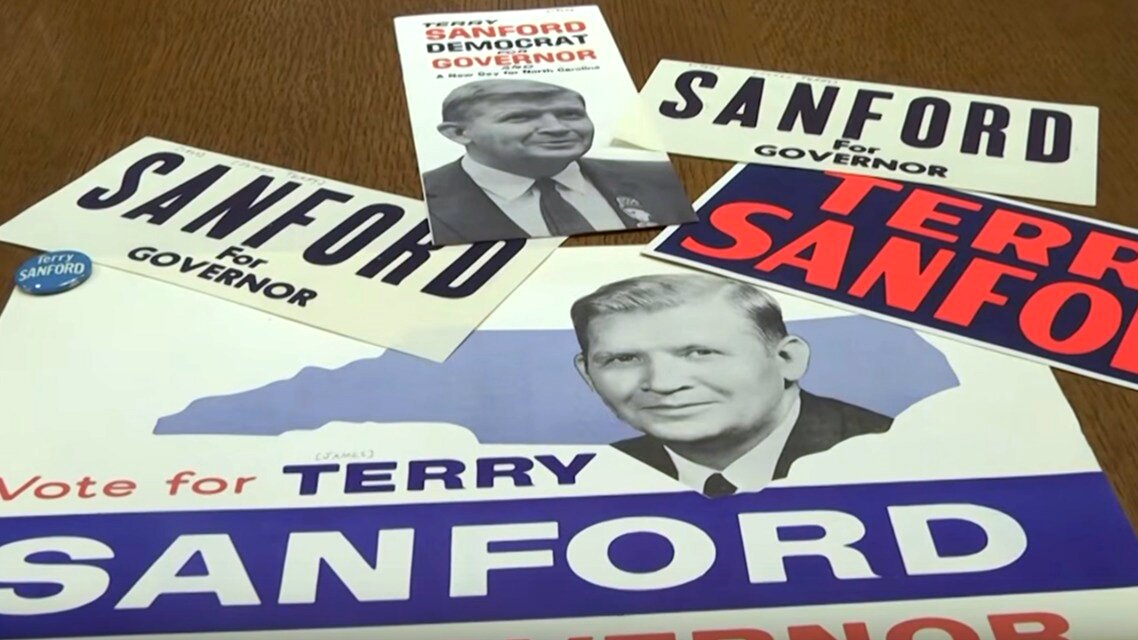Campaigns through the years
|
See related video, showing campaign memorabilia from 1960-1984
By Steve Hartsoe
In the hushed silence of the remodeled David M. Rubenstein Rare Book & Manuscript Library, the chaos and vitriol of political campaigns past come alive.
Campaign memos from political giants with Duke ties are among the items in a diverse collection of campaign memorabilia, memos, flyers and more assembled by library staff.
The materials spanning 1840 to 2009 allow visitors to peel back history and look into candidates’ positions on issues of their day.
In a 1960 brochure, Law School alum Richard Nixon claims fellow presidential candidate Sen. John F. Kennedy’s “rich father helped him buy a million-dollar campaign machine” and that JFK preferred “college reunions to voting on our defense needs.”
The materials also reveal transformation of politicians’ views on major issues of their time.
Terry Sanford, who served as governor of North Carolina and later as president of Duke, was one such politician. Responding to a challenger’s claims in a 1960 gubernatorial campaign flyer, Sanford stated that he opposed the integration of public schools.
A few years later, Gov. Sanford was pushing for the civil rights of the state’s black workers.
The New York Times, in its 1998 obituary for Sanford, states: “Mr. Sanford was governor from 1961 to 1965, a time when civil rights demonstrations were frequently met with violence. In a speech on Jan. 18, 1963, he called for an end to job discrimination against blacks and announced the creation of a biracial panel, the North Carolina Good Neighbor Council, to work toward that end.”
“… We will do it because it is honest and fair for us to give all men and women their best chance in life,” he said.
The campaign collection includes national, state and local election materials. Items include printed material, artifacts and ephemera, such as posters, flyers, buttons, bumper stickers, party platforms, pamphlets, texts of speeches, newspapers and clippings.
In addition to historical figures with strong Duke ties — Sanford was president of the university from 1969 to 1985, and Nixon earned his law degree from Duke in 1937 — the collection includes bumper stickers from Ronald Reagan’s presidential campaign, Kennedy memorabilia (for both John and Robert), a T-shirt supporting Jimmy Carter emblazoned with the words “Not Just Peanuts.” There’s even a brochure from the 1976 Libertarian National Convention in Oregon.
Other items include a Reagan-Bush bumper sticker and a 1964 Lyndon B. Johnson/Hubert Humphrey bumper sticker that reads, “Scientists and Engineers and Physicians for Johnson and Humphrey.”
A black-and-white pamphlet from 1962 featuring a smiling man in a dark suit walking with a briefcase says, “Young Man on the Move – Congressman Bob Dole” dates from the Kansas politician’s first reelection campaign to Congress. He would go on to serve in the House then the Senate until 1996.
Some of the materials reveal how much the culture has changed, including attitudes toward women. Sanford was a decorated World War II veteran and former state senator with a law degree from the University of North Carolina at Chapel Hill when he ran for governor in 1960. Nevertheless, his gubernatorial campaign did not hesitate to advise women to be demure in dealing with local media in its brochure, “Publicity Tips for Women for Terry Sanford.”
“Never tell the newspaper how much space you want, or how to write the headline. Never complain about a story that didn’t turn out the way you thought it should. Always be pleased and grateful. Because the newspapers, not the women, have the last word!”
Elizabeth Dunn, a research services librarian at Rubenstein, said the 1840-2009 exhibit includes items featured in an online collection, “7 Elections that Changed U.S. History.”
“We love our political campaign material because it helps bring previous elections to life,” she said.
Dunn added that the collection – at the Rubenstein and online – reveals similarities between candidates past and president.
“I was able to work on the rollicking election of 1912, whose characters included Republican Party conservative William Howard Taft, charismatic progressive Theodore Roosevelt, scholarly Woodrow Wilson, and fiery socialist Eugene Debs. It is not difficult to find parallels with the characters who populate today’s political stage!”


